Camcore Alumni
Staff

Bill Dvorak, founding director of Camcore, retired in 2014 after 34 years in that role. He began his forestry career with a B.S. in Forestry from Michigan State University, followed by two years in the Fiji Islands with the U.S. Peace Corps, where he developed a passion for forest genetics and tree improvement. Bill continued his studies at NC State University, starting an M.S. program before becoming the Director of Camcore in 1980. While leading the program, he completed his Ph.D. in 1990, further solidifying his expertise in the field. As the director of Camcore, Bill transformed the program from a small initiative with just four industrial members in 1980 to a global network of over 36 members from 22 countries at the time of his retirement. His ability to connect with people at all levels – from corporate executives to field foresters – combined with his deep understanding of silvics, soils, and climate, made him a natural bridge between science and practice. This unique blend of technical expertise and interpersonal skill allowed him to guide Camcore’s growth while fostering a culture of collaboration and innovation that remains central to the program’s mission. Today, Bill continues to support Camcore as an Emeritus Professor, reflecting his lifelong commitment to the advancement of forest genetics and conservation.

Juan Luis Lopez was the Associate Director of Camcore and retired in 2022 after nearly 18 years of service. He holds a B.S. in Forest Engineering from the National University of Colombia, an M.S. in Forest Business Management from the University of Georgia, an M.S. in Wood Science from the University of Toronto, and a Ph.D. in Forestry from NC State University. Before joining Camcore, Juan Luis spent 16 years at Smurfit Kappa Colombia, where he held roles ranging from Nursery Manager to Wood Procurement Manager, gaining valuable operational experience. At Camcore, Juan Luis played a critical role visiting our members, coordinating our seed collections, cultivating healthy relationships with government organizations in Mexico and Central America, and leading Camcore’s teak and Gmelina arborea programs. He also played a very active role in the development of our pine and eucalypt breeding programs, which have been instrumental in Camcore's international success.
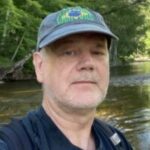
Willi Woodbridge retired in June 2024 after 26 years with Camcore and NC State University. He earned his B.A. in Botany and Plant Biology from Dartmouth College and a Master’s of Forestry from Duke University. Before joining Camcore, Willi worked as a Programmer Analyst with the USDA Forest Service, developing models for simulating forest tree breeding strategies. At Camcore, Willi served as Research Forester and Data Manager, overseeing data processing, quality control, and single-site analyses for genetic trials, while also teaching Excel short courses to Camcore members in more than a dozen countries. In addition to his data management work, Willi played a critical role in wood quality research, standardizing protocols for Resistograph, TreeSonic, and wood sampling. He provided invaluable support to numerous Camcore graduate students whose work involved wood properties, and contributed significantly to the broader understanding of wood properties in Pinus and Eucalyptus species.

After twenty years with Camcore as a research forester focused on the genetic conservation of threatened tree species in the eastern United States Andy Whittier accepted a position in 2023 as the Gulf Atlantic Zone Geneticist with the USDA Forest Service. In this new position he will continue his work on conservation of plant species located across the southeastern US with a focus in South Carolina, Florida, and Puerto Rico. The overlap in genetics and conservation between his roles in Camcore and the USFS will fortunately allow Andy to maintain a relationship Camcore through collaborative projects. We wish Andy success in his new position
Students

Colin Jackson was a master's student in forest genetics. Originally from Oklahoma, he earned his undergraduate degree in microbiology, with an emphasis in cell and molecular biology, from Oklahoma State University. His research focused on using sequence data for SNP calling and comparative genomics in tropical and subtropical pine species.
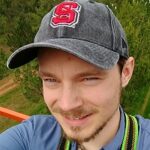
Austin Thomas completed his PhD research on evaluating and selecting Fraser fir clones with increased tolerance to the balsam woolly adelgid, aiming to mitigate the impact of this pest and reduce overall pesticide usage in North Carolina's Christmas tree industry. The results of his work have informed decisions on seed usage from existing Fraser fir seed orchards and influenced breeding designs for developing additional sources of adelgid tolerance.

Luis Ibarra is a Forestry Engineer from Chile who completed his PhD in forest genetics at NC State University. His research, conducted in collaboration with Arauco, focused on estimating breeding values in hybrid populations of P. patula × P. tecunumanii, P. elliottii × P. caribaea, and E. nitens × E. globulus, aiming to identify the best parents for producing high-performing hybrids based on growth traits.
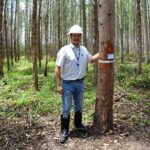
Gustavo Martins, originally from Brazil, earned his degrees in Forest Engineering and Genetics and Plant Breeding from the Federal University of Lavras (UFLA). During his PhD in Forest Genetics at NC State University, he led the Eucalyptus Breeding Program at RGE/APRIL Asia in Indonesia. His research focused on understanding the quantitative genetic basis of trait variation in Acacia crassicarpa, including reproductive traits, tree growth, stem form, wood quality, and biotic resistance. He also explored the potential of genomic technologies to accelerate breeding and improve the accuracy of genetic value predictions.
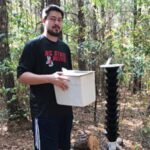
Dominic Manz earned his B.S. in Forestry from NC State University and completed his PhD as part of Camcore’s domestic conservation program under the direction of Robert Jetton. His research focused on assessing the susceptibility of eastern and Carolina hemlocks to the root rot pathogen Phytophthora cinnamomi. During his PhD, he also worked on scale insect management in Fraser fir Christmas tree plantations.
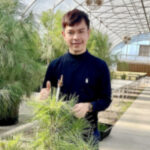
Mindoro Razoki, originally from Indonesia, earned his undergraduate degree in Forest Product Technology from Gadjah Mada University (UGM). With over ten years of experience in wood technology, he works as the Wood Technology Department Leader at Sinarmas Forestry in Indonesia. He completed his M.S. at NC State University under the supervision of Camcore, focusing his research on quantifying the variation in wood properties of Eucalyptus pellita across different ages and estimating age-age correlations. His study aimed to provide insights for early selection in breeding programs and evaluate the economic implications of different harvesting ages.
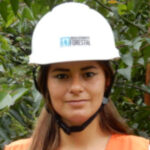
Gina Zabala Martinez was a master’s student at NC State University, working with Camcore as a research assistant under the direction of Robert Jetton. Originally from Colombia, she earned her B.S. in Forest Engineering from Universidad del Cauca. Her master’s research focused on forest pathology, using lab and inoculation techniques to test the susceptibility of different Eucalyptus families to the bacterial pathogen Ralstonia solanacearum, with the goal of developing management strategies for this pathosystem. She now leads the Pathology Program at Smurfit Westrock Colombia.
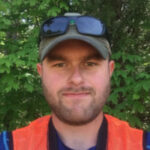
Jacob Bost completed his M.S. in Forestry at NC State University, where he focused on biomass estimation in the pocosin swamps of the Hoffman Forest in eastern North Carolina. He began his forestry education with an associate degree from Montgomery Community College before transferring to NCSU to complete his B.S. in Forestry.

Lauren Gonzalez is a Ph.D. student at North Carolina State University under the supervision of Robert Jetton. Originally from Miami, Florida, Lauren got her bachelor’s of science in biology from the University of North Carolina at Charlotte and her master’s of science in biology from Western Carolina University. Her research focuses on the management of Adelges tsugae, hemlock woolly adelgid, as well as conservation of eastern and Carolina hemlock. Through the use of silvicultural techniques, she will study the effects of canopy condition, competition control, and their integration with chemical and biological pest management on the establishment and early growth of hemlock seedlings planted for restoration.









